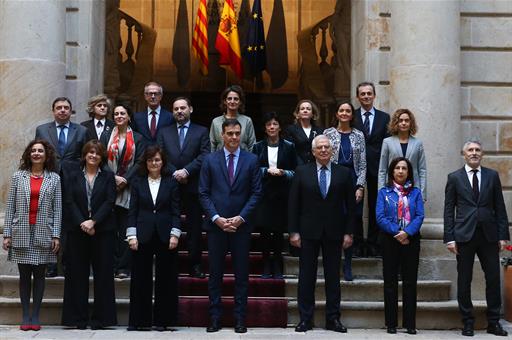Council of Ministers
Government raises minimum wage for 2019 to 900 euros
Council of Ministers - 2018.12.21
Llotja de Mar, Barcelona
The Council of Ministers approved the Royal Decree setting a 22.3% increase in the minimum wage for 2019, the largest rise since 1977, which will benefit close to 2.5 million workers.
The Minister for Education and Vocational Training, and Government Spokesperson, Isabel Celaá, stated that this rise "places us at 80.6% of the average minimum wage in Europe, and furthermore, favours women by 56%".
The aim of the increase is to prevent poverty at work, increase the standard of living of people on the lowest incomes, such as women and young people, and push through a more dynamic wage rise in line with international recommendations and with the minimum increase agreed with the social stakeholders under the 4th Agreement for Employment and Collective Bargaining.
The amounts to be paid out under the minimum wage in 2019 will be 30 euros a day, in other words, 900 euros a month. For casual labour, this will stand at 42.62 euros a day and 7.04 euros an hour for domestic workers.
Wage rise for public servants
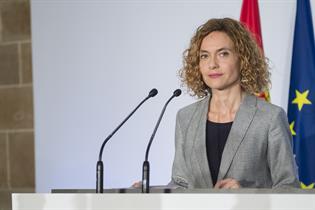 Pool Moncloa/Borja Puig de la BellacasaThe Govenrment approved a Royal Decree-Law on urgent measures regarding remuneration in the public sector that will amount to a wage rise for 2.5 million people in the three tiers of government - State, regional and local - and in the public business sector as from 1 January.
Pool Moncloa/Borja Puig de la BellacasaThe Govenrment approved a Royal Decree-Law on urgent measures regarding remuneration in the public sector that will amount to a wage rise for 2.5 million people in the three tiers of government - State, regional and local - and in the public business sector as from 1 January.
The Minister for Territorial Administration and Public Function, Meritxell Batet, explained that a fixed rise of 2.25% is established for all public servants, to which a variable increase of 0.25% may be added, which will be determined according to the rise in GDP. In addition, another 0.25% will be allocated from additional funds to improve productivity, which will be distributed according to negotiations with the trade unions in each region.
Meritxell Batet declared that under the wage rise agreed on Friday, the government acknowledges "the effort made by public servants to help the country overcome the crisis, their dedication, their professionalism and their vocation for public service". Furthermore, it meets the commitment made to the trade unions to improve the working and pay conditions of all public servants, who have had to suffer freezes, and even reductions, in their salaries in recent years.
The minister reiterated that the government "wants to boost the public sector and public institutions in Spain", to which end it must once again provide them with the economic, material and human resources they need.
Meritxell Batet explained that the decision to approve these pay rises through a Royal Decree responds to the need to avoid a period of uncertainty until the approval of the General State Budget and ensure that that the increase comes into force as from 1 January.
More measures to boost public employment
During her speech, Meritxell Batet highlighted that the measure agreed on Friday falls in line with those approved during the last six months in power. These include the approval of the largest Public Employment Offer since 2008, the 8% reduction in temporary employment contracts, the extension of paternity leave to 16 weeks and the mobility of public servants that are victims of abuse with full guarantees.
She also recalled that those affected by AIDS, diabetes, celiac diseases and psoriasis can now work for the State law enforcement agencies, the Armed Forces and the Customs Surveillance Corps and Penitentiary Institutions.
Training for workers
The Council of Ministers approved the call for proposals for subsidies to finance State training programmes, charged to the budget allowance for spending by the State Public Employment Service, for a sum of 350 million euros.
These programmes are designed as a priority for people in work and orientated towards the acquisition and improvement of professional skills related to the productivity and competitiveness requirements of enterprises.
Just transition for coal mining
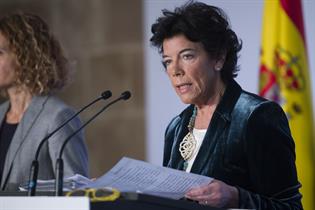 Pool Moncloa/Borja Puig de la BellacasaUpon a proposal from the Ministry for the Ecological Transition, the Council of Ministers approved a Royal Decree-Law on urgent measures for the just transition of coal mining and the sustainable development of mining districts.
Pool Moncloa/Borja Puig de la BellacasaUpon a proposal from the Ministry for the Ecological Transition, the Council of Ministers approved a Royal Decree-Law on urgent measures for the just transition of coal mining and the sustainable development of mining districts.
The new text formalises the Framework Agreement for a Just Transition of Coal Mining and the Sustainable Development of Mining Districts for the Period 2019-2027, signed in October by the government, the trade unions Comisiones Obreras (CCOO), Unión General de los Trabajadores (UGT) and Unión Sindical Obrera (USO), and the National Federation of Coal Mining Companies (Spanish acronym: Carbounión).
In general terms, the agreement provides for early retirement and incentivised dismissals for workers and the creation of a labour exchange for non-retired workers, which sub-contracted workers may sign up to.
"Spain has 2,000 miners at this time to whom we must provide fair conditions for their transfer to other jobs", remarked the minister, Isabel Celaá.
Historical memory
The Government Spokesperson explained that the government has officially rejected the decision by the war council which, in 1940, ordered the execution of the President of the Regional Government of Catalonia, Lluís Companys i Jover, and of the declaration of reparation and restitution of his full dignity.
Along the same lines, the government has acknowledged the injustice and illegitimacy of the ministerial provision that agreed, during the dictatorship, to the dismissal of seven academics from the Royal Academy of Exact, Physical and Natural Sciences. The government also approved the creation of a working committee for the rehabilitation and guarantee of the right to honour of the members of Royal Academies and other national academies penalised during the civil war and the dictatorship.
Josep Tarradellas and César Manrique Airports
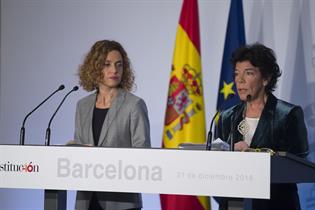 Pool Moncloa/Borja Puig de la BellacasaThe airports in Barcelona and Lanzarote will be renamed, as agreed by the government on Friday.
Pool Moncloa/Borja Puig de la BellacasaThe airports in Barcelona and Lanzarote will be renamed, as agreed by the government on Friday.
The first will be called "Josep Tarradellas Barcelona-El Prat" to honour the memory, 30 years after his death, of the first President of the Regional Govenrment of Catalonia of the democracy.
"This is a decision that sends out a message of concord, understanding and dialogue, claimed the Government Spokesperson, Isabel Celaá.
The airport in Lanzarote will be renamed "César Manrique-Lanzarote" in memory of the Canary Island artist, on the occasion of the centenary of his birth on 24 April.
Better highways
The government authorised the signing of agreements on highways with the Regional Government of the Canary Islands for a total sum of 1.8 billion euros to 2025, and of four service contracts for the implementation of several conservation and maintenance contracts on State highways in Catalonia for a sum of 85.31 million euros. The Government Spokesperson stressed the importance of "establishing favourable conditions for public and private economic growth".
Transposition of European Directives
With the aim of completing the transposition of EU Directives and Regulations to the Spanish legal system, the Council of Ministers approved a Royal Decree to develop the Securities Market Act for its adaptation to the new Directive on markets in financial instruments (better known as MIFID II) and a Royal Decree-Law on several Directives on trademarks, railway transport and package holidays.
Report on criminalisation of sexual offences
The government analysed the report drawn up by the Codification Committee of the Ministry of Justice proposing imprisonment for any sexual offence against a woman without her consent, and the abolition of the offence of sexual abuse, so that the only remaining offences are sexual assault and rape.
"The first exists whenever there is any conduct towards a woman without her consent, and rape exists with penetration", explained Isabel Celaá, who highlighted the work that the government has been carrying out for the last six months to develop measures under the State Pact to Combat Gender-based Violence. "We want women to be safe and feel safe", she claimed.
Weekly assessment
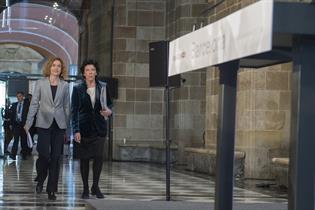 Pool Moncloa/Borja Puig de la BellacasaIn her review of current affairs during the week, the Minister for Education and Vocational Training, Isabel Celaá, described the murder of the young teacher Laura Luelmo as "a regrettable episode of male violence" and passed on her condolences and the solidarity of the government to her family.
Pool Moncloa/Borja Puig de la BellacasaIn her review of current affairs during the week, the Minister for Education and Vocational Training, Isabel Celaá, described the murder of the young teacher Laura Luelmo as "a regrettable episode of male violence" and passed on her condolences and the solidarity of the government to her family.
The Government Spokesperson also referred to the appearance by the President of the Government in the Upper House to take stock of the first six months in power "aimed at moral and political regeneration", in which he called for common sense from the parliamentary groups to support the Budget which "will lead to more resources to protect the Welfare State".
Isabel Celaá also highlighted that the Lower House of Parliament approved, on Thursday, the new deficit path agreed by the Council of Ministers and called for responsibility from the main opposition party to not veto the bill in the Upper House.
Non official translation





